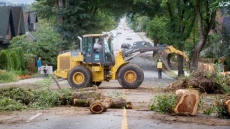OTTAWA — The federal government and the provinces are expected to announce plans to work on harmonizing recycling standards following a meeting of environment ministers in Halifax today.
Environment Minister Catherine McKenna will sit down at a table with her provincial counterparts where it is hoped the tense dispute over carbon taxes can be shelved long enough to reach some agreements on plastics.
Five of the provinces at the table are challenging or plan to challenge Ottawa in court over its "backstop" carbon tax, and a decision in Ontario's case is coming Friday.
McKenna acknowledged the challenges she has with provincial governments over climate change policies, but she said the hope is for movement on plans on both plastic standards and producer responsibility.
"Canadians expect progress on this issue," she said.
The fact they are meeting face-to-face at all might be progress. Last fall the group was to meet in person in Ottawa to discuss plastic pollution but that meeting was first downgraded to a video chat and eventually just a phone call. While officials chalked it up to scheduling conflicts, behind the scenes it was said that the carbon-tax disagreements between Ottawa and many provinces was to blame.
During that call the provinces and Ottawa agreed to work toward cutting Canada's waste in half by 2040 and trying to eliminate plastic as a source of garbage altogether. Today's meeting is aimed at putting the action in that action plan, including finding ways to make it easier to recycle plastics to begin with, as well as requiring producers of plastic to be responsible for ensuring their products get recycled.
Much of the responsibility for plastics standards and producer responsibility lies with provincial governments.
Canada only recycles about nine per cent of the plastic it produces. According to a recent report prepared for Environment Canada by Deloitte and ChemInfo Services, in 2016 Canadians threw out 3.3 million tonnes of plastic, 12 times more than was recycled.
"A nine-per-cent recycling rate is abysmal," McKenna said, ahead of the meeting.
There are a limited number of recycling facilities in Canada, and a lack of standards for plastic packaging makes it difficult to recycle many items. Different dyes or glues used in labels can make recycling impossible, for example.
The Deloitte report also mentioned that it is still cheaper and easier to produce and use new plastic than it is to recycle and use recycled plastics. The report recommended setting standards to require packaging materials and other products to use a set amount of recycled material to create new demand that would propel growth in the domestic recycling industry.
Prime Minister Justin Trudeau announced earlier this month that Canada was looking at banning a number of single-use plastic items within the next two years, including Styrofoam take-out containers, plastic straws and cutlery.
The products that will be banned won't be determined until the Canadian Environmental Protection Act review process is completed.
But environment groups aren't certain the provinces or Ottawa are getting a strong enough message about the need to reduce plastics to begin with. A number of environment organizations plan to "roll out a plastic carpet" outside the ministers' meeting Thursday, using some of the 113 kilograms of plastic waste collected in Halifax Harbour on June 15.
Sarah King, head of the oceans and plastic program at Greenpeace Canada, said there is not enough focus in provincial-federal talks about stopping the use of plastics altogether. She said the focus is still mostly on what to do with plastics when people are done with them, rather than finding new ways to deliver products to people and eliminating the single-use mentality consumers currently have.

